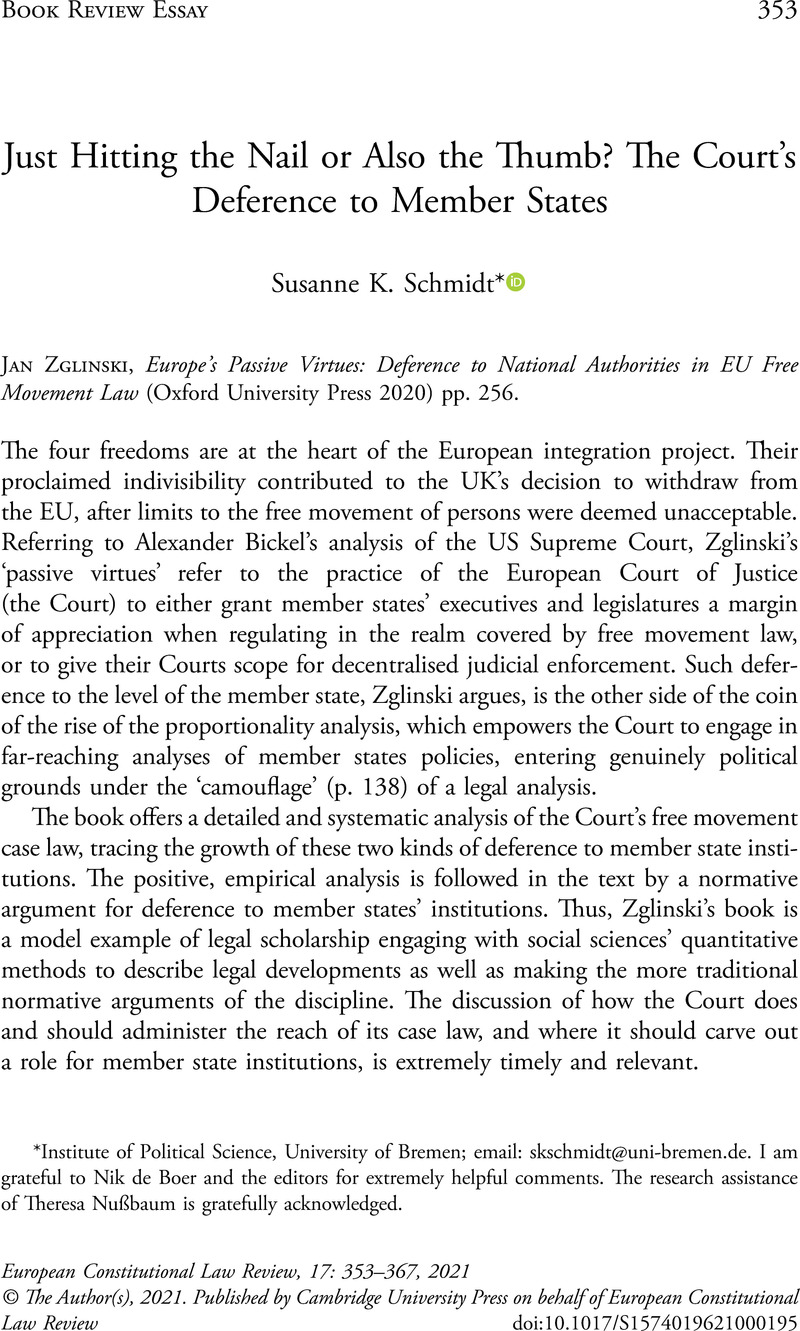No CrossRef data available.
Published online by Cambridge University Press: 16 July 2021

I am grateful to Nik de Boer and the editors for extremely helpful comments. The research assistance of Theresa Nußbaum is gratefully acknowledged.
1 C. Joerges, ‘Deliberative Supranationalism – Two Defences’, 8 European Law Journal (2002) p. 133; J. Neyer, The Justification of Europe. A Political Theory of Supranational Integration (Oxford University Press 2012).
2 J.K. Staton and W.H. Moore, ‘Judicial power in domestic and international politics’, 65 International Organization (2011) p. 553.
3 A. Hamilton, Federalist No 78.
4 R.D. Kelemen, ‘The limits of judicial power: trade-environment disputes in the GATT/WTO and the EU’, 34 Comparative Political Studies (2001) p. 622.
5 U. Kranenpohl, ‘Die Bedeutung von Interpretationsmethoden und Dogmatik in der Entscheidungspraxis des Bundesverfassungsgerichts’ [‘The importance of interpretation methods and dogmatics in the decision-making practice of the Federal Constitutional Court’], 48 Der Staat (2009) p. 387 at p. 393.
6 M. Cappelletti et al., Integration Through Law. Europe and the American Federal Experience. Volume 1: Methods, Tools and Institutions (Walter de Gruyter 1986).
7 M.P. Egan, Single Markets. Economic Integration in Europe and the United States (Oxford University Press 2015).
8 M. Matthijs et al., ‘Ever Tighter Union? Brexit, Grexit, and Frustrated Differentiation in the Single Market and Eurozone’, 17 Comparative European Politics (2019) p. 209 at p. 210 ff.
9 A. Schenk and S.K. Schmidt, ‘Failing on the social dimension: Judicial law-making and student mobility in the EU’, 25 Journal of European Public Policy (2018) p. 1522.
10 C. Barnard, ‘Restricting restrictions: lessons for the EU from the US?’, 68 Cambridge Law Journal (2009) p. 575.
11 M. Risak, ‘The Position of Volunteers in EU-Working Time Law’, 10 European Labour Law Journal (2019) p. 362.
12 H. James, Making the European Monetary Union (Harvard University Press 2012).
13 F.W. Scharpf, ‘Forced Structural Convergence in the Eurozone’, in A. Hassel and B. Palier (eds.), Growth and Welfare in Advanced Capitalist Economies How Have Growth Regimes Evolved? (Oxford University Press 2021) Table 5.3.
14 G. Davies, ‘Brexit and the Free Movement of Workers: A Plea for National Legal Assertiveness’, 41 European Law Review (2016) p. 925 at p. 926.
15 D. Finke, ‘A Guardian in Need of Support: the Enforcement of EU State Aid Rules’, Journal of European Public Policy (2021) at p. 15, ⟨https://www.tandfonline.com/doi/epub/10.1080/13501763.2021.1873403?needAccess=true⟩, visited 21 June 2021.
16 N. Lindstrom, ‘Aiding the State: Administrative Capacity And Creative Compliance With European State Aid Rules in New Member States’, Journal of European Public Policy (2020), ⟨https://www.tandfonline.com/doi/epub/10.1080/13501763.2020.1791935?needAccess=true⟩, visited 21 June 2021.
17 G.N. Rosenberg, The Hollow Hope: Can Courts Bring about Social Change? American Politics and Political Economy (University of Chicago Press 1993).
18 D.S. Martinsen, An Ever More Powerful Court? The Political Constraints of Legal Integration in the European Union (Oxford University Press 2015).
19 K.J. Alter and S. Meunier-Aitsahalia, ‘Judicial politics in the European Community. European integration and the pathbreaking cassis de Dijon decision’, 26 Comparativ Political Studies (1994) p. 535.
20 D. Grimm, The Constitution of European Democracy (Oxford University Press 2017).
21 M. Höpner and S.K. Schmidt, ‘Can We Make the European Fundamental Freedoms Less Constraining? A Literature Review’, 22 Cambridge Yearbook of European Legal Studies (2020) p. 182 at p. 190.
22 T. Horsley, The Court of Justice of the European Union as an Institutional Actor (Cambridge University Press 2018) p. 14.
23 G. Silverstein, Law’s Allure: How Law Shapes, Constrains, Saves, and Kills Politics (Cambridge University Press 2009) p. 268.
24 C. Joerges and F. Rödl, ‘Informal politics, formalised law and the ‘social deficit’ of European integration: reflections after the judgments of the Court in Viking and Laval’, 15 European Law Journal (2009) p. 1.
25 S. Garben, ‘Competence Creep Revisited’, 57 Journal of Common Market Studies (2019) p. 205 at p. 216; F.W. Scharpf, ‘De-constitutionalisation and majority rule: A democratic vision for Europe’, 23 European Law Journal (2017) p. 315 at p. 318.
26 The mayor of Mannheim, at the committee of the regions, criticised the fact that all land development plans seemed to need notification: ⟨http://www.mrn-news.de/2019/06/28/mannheim-ob-dr-kurz-spricht-in-bruessel-zur-drohenden-notifizierungspflicht-fuer-kommunale-bebauungsplaene-393743/⟩, visited 21 June 2021.
27 R. Hirschl, Towards Juristocracy: The Origins and Consequences of the New Constitutionalism (Harvard University Press 2007) p. 44.